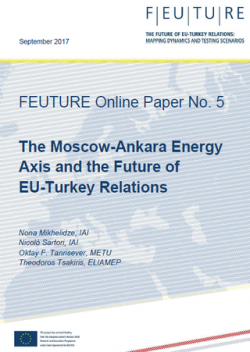The Moscow-Ankara Energy Axis and the Future of EU-Turkey Relations
The Turkey-Russia-EU energy triangle is a relationship of interdependence and strategic compromise. However, Russian support for secessionism and erosion of state autonomy in the Caucasus and Eurasia has proven difficult to reconcile for western European states despite their energy dependence. Yet, Turkey has enjoyed an enhanced bilateral relationship with Russia, augmenting its position and relevance in a strategic energy relationship with the EU. The relationship between Ankara and Moscow is principally based on energy security and domestic business interests, and has largely remained stable in times of regional turmoil. This paper analyses the dynamics of Ankara-Moscow cooperation in order to understand which of the three scenarios in EU–Turkey relations – conflict, cooperation or convergence – could be expected to develop bearing in mind that the partnership between Turkey and Russia has become unpredictable. The intimacy of Turkish-Russia energy relations and EU-Russian regional antagonism makes transactional cooperation on energy demand the most likely of future scenarios. A scenario in which both Brussels and Ankara will try to coordinate their relations with Russia through a positive agenda, in order to exploit the interdependence emerging within the “triangle”.
-
Details
Cologne, University of Cologne, September 2017, 18 p. -
In:
-
Issue
Online Paper 5
Introduction
1. Turkey–Russia relations within the bilateral and regional context
2. Key drivers and focal issues: territorial conflicts in the Black Sea region
3. Key drivers and focal issues: Turkey’s dependence on Russia
4. Key drivers and focal issues: The role of Turkey and Russia in the Southern Gas Corridor
Conclusions: the Moscow–Ankara energy axis and the future of EU–Turkey relations
References
About the Authors



